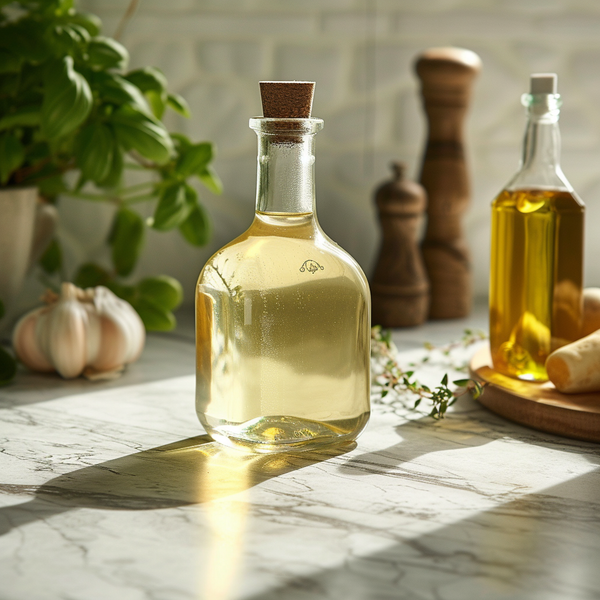
white vinegar
White vinegar, known for its clear appearance and sharp, acidic flavor, is a versatile ingredient used in various culinary applications. It's made from distilled grain alcohol, undergoing a fermentation process that produces acetic acid—the primary component giving vinegar its sour taste. Here's how white vinegar is commonly used in cooking:
Pickling:
White vinegar is a popular choice for pickling vegetables due to its strong acidity, which helps preserve the pickles and imparts a tangy flavor.
Salad Dressings and Marinades:
It's used in salad dressings, vinaigrettes, and marinades, adding acidity that can balance the flavors of oil and spices, and tenderize meats.
Baking:
A small amount of white vinegar can be added to cake and bread doughs to interact with baking soda, creating carbon dioxide and helping the dough rise. It's especially useful in vegan baking as a substitute for eggs.
Sauces and Condiments:
White vinegar is used in the preparation of sauces and condiments, such as mayonnaise, hot sauce, and ketchup, contributing a tangy flavor profile.
Boiling Eggs:
Adding white vinegar to the water when boiling eggs can help the whites coagulate faster if the shell cracks, making the eggs easier to peel.
Sushi Rice:
It's used to season sushi rice, along with sugar and salt, to achieve the characteristic tangy flavor of sushi rice.
Cleaning Vegetables and Fruits:
A solution of white vinegar and water can be used to clean vegetables and fruits, helping to remove surface bacteria and pesticide residues.
Deglazing Pans:
White vinegar can be used to deglaze pans after sautéing or frying, helping to lift the flavorful browned bits from the bottom of the pan, which can then be used as a base for sauces.
Cheese Making:
It's used in some cheese-making processes to curdle milk, separating the curds from the whey.
Preserving Color:
Adding white vinegar to the cooking water of vegetables like cauliflower and potatoes can help preserve their color, keeping them bright and white.
When using white vinegar in cooking, it's important to consider its acidity and how it might affect the overall flavor of the dish. White vinegar should be used judiciously, as too much can overpower other flavors. Its high acidity makes it an excellent ingredient for balancing rich and fatty flavors, and its preservative qualities are ideal for pickling and fermenting.
Nutritional Information
calories
-1
carbohydrates
-2 g
fats
0 g
protein
-2 g